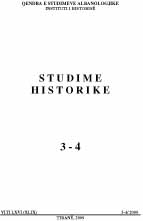Mësuesit shqiptarë dhe riorganizimi i shkollës (1960-1965)
The Albanian teachers and the reorganisation of the schooling system (1960-1965)
Author(s): Enriketa KamboSubject(s): History
Published by: Qendra e Studimeve Albanologjike
Keywords: Albanian teachers ; reorganisation of the schooling system ; 1960-1965 ; Albania; Albanian History;
Summary/Abstract: The changes experienced by the Albanian schooling system in the beginning of the 60s with the implementation of the reform for the reorganisation of the education was defining for the course of the personnel problems. Common for the whole of the period is the pursuing of the same earlier policies that did not generate overturn. It is the case for developments within the same political system which were dictated due to the need for its consolidation. In addition, the Labour Party of Albania took many measures to obtain a sufficient number of qualified teachers, professionally trained and especially formed as “missionaries” of the communist education for the new generations. These were the two fundamental directions of the official Albanian policy until the full fall of the system in the 90s. In resolving issues of the education-teaching staff, was operated in the same way and were applied methods as in the previous periods. Although it should be noted that was attempted an increase in the efficiency. In this regard, the new measures that were taken aimed the development and consolidation of the entire system of preparation and training of personnel. In the training field of new personnel it continued the application of a combination method. In this way it continued the application of accelerated training forms with the regular ones, with a tilt of the balance by the latter. The selection of the personnel was based on the class criterion and it remained a constant policy. Priority was given to the attraction in the whole pedagogical-education system of elements that originated from a poor background from the countryside and the working class. Something, that led to important changes in the social composition of the teaching personnel. The relative strengthening of the education-teaching system created more spaces that led to important quantitative developments. The largest recruitments according to data from the academic year 1965-1966 were observed in the upper classes of the 8-year school. Wile the needs for sufficient personnel in the primary education were fulfilled. Relative developments on a national level were also observed as an increase on the number of high school teachers. A smaller amount of changes was observed in the field of training, which for a long period remained a "weak point" for the whole pedagogicaleducation system. The analysis of the documentation of this particular period from 1960 to 1965 leads to the conclusion that the process of training and the qualification of the new teaching personnel was done in a constrained manner. The methods employed were not appropriate in two aspects that of the general culture training as well as that professional and methodical training. Consequently, although there were considerable quantitative changes in relation to the beginning of this period, the entire system and especially that of training, failed to become consolidated sufficiently.
Journal: Studime Historike
- Issue Year: 2009
- Issue No: 03-04
- Page Range: 139-158
- Page Count: 20
- Language: Albanian
- Content File-PDF

